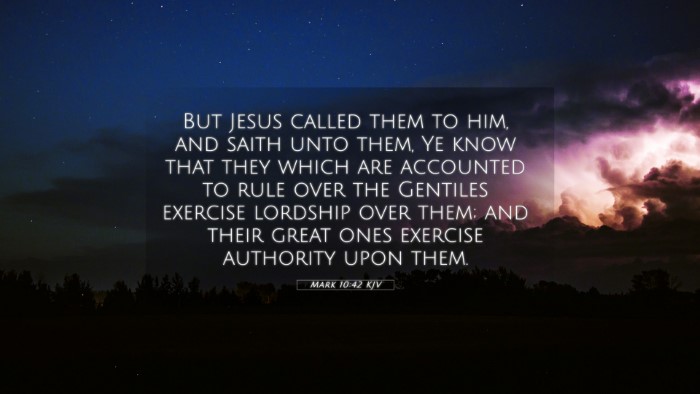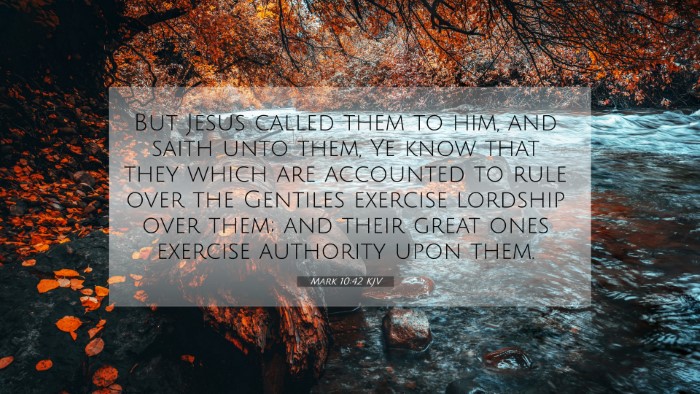Understanding Mark 10:42
Mark 10:42 reads:
"But Jesus called them to Him, and said to them, 'You know that those who are considered rulers over the Gentiles lord it over them, and their great ones exercise authority over them.'" (NKJV)
Verse Meaning and Interpretation
This verse presents a profound contrast between worldly authority and the leadership that Jesus exemplifies. Below is a combined summary derived from various public domain commentaries:
-
Matthew Henry:
Henry emphasizes that Jesus is illustrating the corrupt nature of earthly leaders who thrive on power and dominance. Instead, true greatness in God's kingdom is marked by servitude and humility, which opposes the ambition seen in secular rulers.
-
Albert Barnes:
Barnes explains that rulers in the Gentile world exert their power and authority over others, often demanding obedience and respect. However, Jesus calls for a different form of leadership that prioritizes serving others over exercising control.
-
Adam Clarke:
Clarke suggests that the heart of Jesus’ message is about the transformational nature of God's kingdom. Leadership is not about lording over people but about serving them, which is central to understanding the mission of Christ.
Thematic Connections
The message in Mark 10:42 relates to numerous themes across the Scriptures. Understanding these connections enhances our grasp of Biblical teachings:
-
Servant Leadership:
This theme is echoed in Matthew 20:26-28, where Jesus states, "Whoever desires to become great among you, let him be your servant." This reinforces the idea that greatness in God’s eyes is linked to service.
-
Authority of Jesus:
Mark 1:27 highlights the authority of Jesus over evil spirits as fundamentally different from worldly authority, indicating the divine form of leadership.
-
Humility:
Philippians 2:3 encourages believers to consider others better than themselves, paralleling Jesus' call for humility in leadership.
-
Example of Jesus:
John 13:14-15 shows Jesus washing His disciples' feet, which serves as a practical example of servant leadership.
-
Power in Weakness:
2 Corinthians 12:9 reminds us that God's strength is made perfect in weakness, contrasting the idea of strength in lording over others.
-
Counter-Cultural Leadership:
1 Peter 5:3 advises leaders to be examples to the flock, not domineering, aligning with Jesus’ teachings in Mark 10:42.
-
Love and Service:
Galatians 5:13 reminds believers that they are called to freedom, but should serve one another through love, reinforcing the essence of Jesus’ message about authority.
Bible Verse Cross-Referencing
The importance of cross-referencing Bible verses cannot be overstated for broader understanding. To grasp the full biblical narrative regarding leadership and service, consider the following:
- Matthew 20:26-28 - The call to servant leadership.
- Mark 1:27 - The unique authority of Jesus.
- Philippians 2:3 - Emphasis on humility.
- John 13:14-15 - Jesus exemplifies service.
- 2 Corinthians 12:9 - Strength in weakness.
- 1 Peter 5:3 - Guiding principles for leaders.
- Galatians 5:13 - Serving one another in love.
- Luke 22:26-27 - True greatness contrasted with worldly views.
Cross-Referencing Resources
To delve deeper into the connections between Scripture, the following tools can be helpful:
- Use a Bible concordance for identifying key themes and verses.
- Bible reference resources can guide systematic study.
- A cross-reference guide helps in discovering thematic links.
- Consider cross-reference Bible study methods for a structured approach.
Conclusion
Mark 10:42 invites us to re-evaluate our concepts of leadership and authority through the lens of servitude, as modeled by Jesus Christ. By cross-referencing related Scriptures, we can enrich our understanding and application of these principles in our lives. As we approach the Word of God, let us remember that every verse holds a unique place within the grand narrative of God’s love and guidance.





